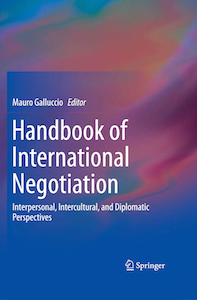
“Handbook of International Negotiation” out now
We are proud and honored to announce the worldwide release of our latest book, entitled « Handbook of International Negotiation: Interpersonal, Intercultural and Diplomatic Perspectives », via Springer Publishing.
Edited and directed by Mauro Galluccio, Ph.D., President of EANAM, this work is a collaborative approach to international negotiation, conflict management and preventive diplomacy. The originality of this volume lies in its cross-disciplinary approach, aimed at converging contributions from experts in the fields of Social, Cognitive and Behavioral Psychology, Neurobiology, Emotional intelligence and Regulation, or even Diplomacy, towards an innovative study of peace and negotiation.
This book is targeted at international peace and conflict management negotiators, decision-makers, politicians, students and scholars in peace studies. With a particular stress on actual and instructive cases like North Korea, Lebanon or Afghanistan, it offers leading-edge concepts and science-based models for fostering alternatives to violent and armed conflicts. As such, the Handbook of International Negotiation proposes in-depth tailored training as a solution aimed at provoking behavioral changes in participants, through different scenarios and situations; indeed, training as it is conceived nowadays is not sustainable if it does not take into account interpersonal dynamics and communities’ behavior. We believe that, as a matter of fact, the real challenge for mankind is not that of flying to Mars and conquering the space, or digging deeper into the earth to conquer new oilfields, but rather of simply walking together on this planet Earth, trying to safeguard our common humanity and dignity.
The seven key areas of the book are divided into 30 chapters, written by top-ranking contributors and leading researchers, discussing the following range of topics:
- Section I: Decisions Making Approaches to Negotiation
- Representative Decision-Making: Challenges to Democratic Peace Theory (by Esra Cuhadar and Daniel Druckman)
- Tacit Knowledge Awareness and its Role in Improving the Decision-Making Process in International Negotiations (by E. Thomas Dowd)
- A Psychotherapist’s View of Decision-Making: Implications for Peaceful Negotiations (by Donald Meichenbaum, Ph.D.)
- Moral Disengagement in “War Fever”: How can we resist? (by Alfred L. McAlister Ph.D. and Brittanie Wilczak M.P.H.)
- Section II: Re-framing Approaches to Negotiation
- The biology of Cooperative Decision-Making: Neurobiology to International Relations (by Nicholas D. Wright M.R.C.P., Ph.D.)
- Psychological Dynamics of Insight: Relevance to International Negotiation (by Neil Sargent and Andrea Bartoli)
- Why is it so difficult to Resolve Intractable Conflicts Peacefully? A Sociopsychological Explanation (by Daniel Bar-Tal, Eran Halperin and Ruthie Pliskin)
- Dignity in Negotiation: its Transforming Power (by Barry Hart Ph.D.)
- Section III: Conflict Management and International Negotiation
- Negotiating Conflict Transformations (by Louis Kriesberg)
- The Evolution of Readiness Theory (by Dean G. Pruitt)
- Why is Mediation so Hard? The case of Syria (by Chester A. Crocker, Fen Osler Hampson, Pamela Aall and Simon Palamar)
- Underpinning Conflict Prevention by International Cooperation (by Cornelia E. Nauen and Ursula Hillbrand)
- Section IV: Emotions Regulation in Negotiation
- Improving Negotiation Effectiveness with Skills of Emotional Competence (by Carolyn Saarni)
- International Negotiation and Emotional Intelligence (by David R. Caruso)
- From Conflict to Peace Through Emotional Regulation and Cooperation (by Felicity de Zulueta)
- Mindfulness-based Training for Negotiators: Fostering Resilience in the Face of Stress (by Mauro Galluccio and Jeremy D. Safran)
- Section V: Cognitive and Behavioural Approach to Negotiation
- A Cognitive Insight on Cooperation and Conflict (by Mauro Galluccio and Aaron T. Beck)
- Impediments and Strategies in Negotiating: A Cognitive Therapy Model (by Robert L. Leahy Ph.D.)
- Negotiating in the World of Mixed Beliefs and Value Systems: A Compassion-focused Model (by Paul Gilbert Ph.D., O.B.E.)
- Cognitive Behavioral Therapy Inspiring Values in the Planning and Management of Lebanon National Conflicts Resolution: A Brief Essay (by Aimée Karam)
- Section VI: The Intercultural Dimension of International Negotiation
- Reflections on the Cultural Contexts of Conflict Resolution via Truth and Reconciliation Processes (by Anthony J. Marsella Ph.D.)
- On Instinctive Human Peace Versus War (by David P. Barash)
- Beyond Impasse: Addressing Sacred Values in International Political Negotiations (by Nichole Argo Ph.D. and Jeremy Ginges Ph.D.)
- Developing a Global Community: A Social Psychological Perspective (by Morton Deutsch Ph.D., Eric C. Marcus Ph.D. and Sarah J. Brazaitis Ph.D.)
- Section VII: Diplomacy and International Negotiation
- An Inquiry on War and Peace: Negotiating Common Ground Processes (by Cardinal Renato Raffaele Martino)
- Negotiating Partners: Friends or Foes? (by Cameron Hume)
- Environment and Science: Finding Common Ground Through International Agreements. An Insider’s View of Negotiation Processes (by Richard J. Smith)
- Micro-negotiation in the Security Sector Advising Context: A Case Study from Afghanistan (by Erik J. Leklem)
- Development Cooperation and Negotiation in Practice (by Gerardus Gielen)
- Diplomacy Meets Science: Negotiating Responsible and Inclusive Growth (by Mauro Galluccio and Laura Vivani)
If you wish to find out more and buy the book, feel free to visit the dedicated page on our website or the page of Springer, our publisher.
